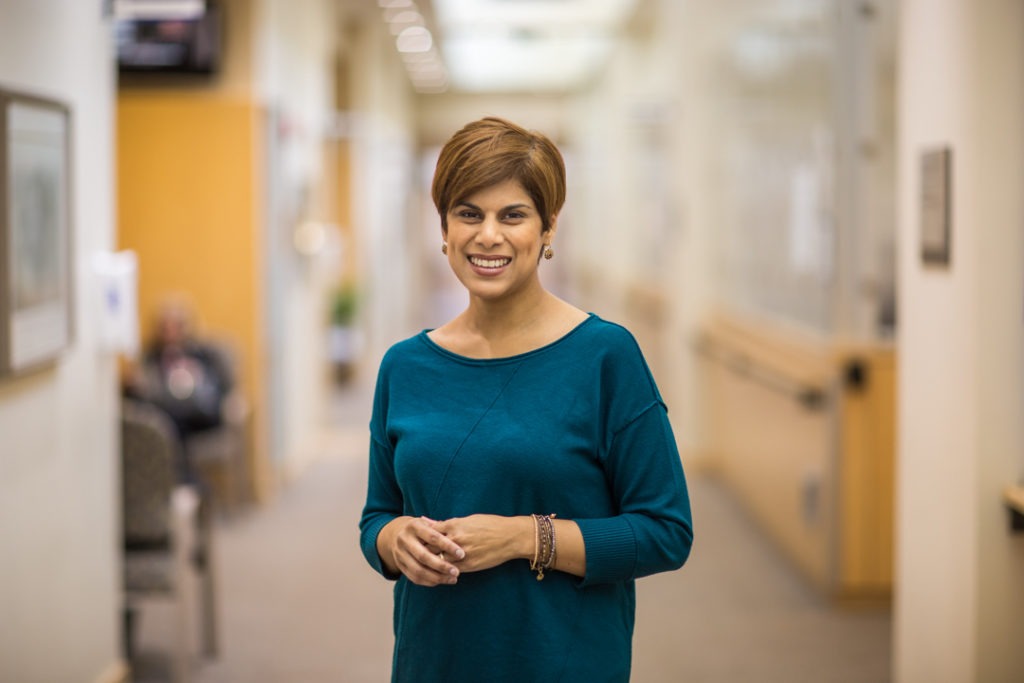
The thing about cancer is…it brings out the best in people
By Michele Cardoso
A letter to my patients
The thing about cancer is …it brings out all the best in people: resilience, courage, hopefulness, compassion, and kindness. It strengthens true friendships and community. When people ask me what I do, I get these pitying looks and they say, “wow that must be depressing” or “how do you do that?” Yes, we have difficult days but truly we see the very best aspects of humanity in the patients we treat.
Coming into Juravinski Cancer Centre (JCC) for the first time is like entering another world, even for a new health care provider. I have never forgotten the overwhelming feeling of shock I felt when I began working here years ago. I was realizing how many people are affected by cancer and how little it is understood by the outside world – those who haven’t experienced it. Yes, treating cancer is challenging. It this is certainly not a job I can leave without a second thought at 5 p.m. but I think that is the same for all staff here. We don’t just care, we care deeply, and we wouldn’t be able to give compassion if it was something we could switch off.
Working in the radiation therapy department, we have the privilege of forging relationships with patients who come daily, sometimes for several weeks of treatment. We share the journey with our patients and in doing so, bear witness to the emotional experience of cancer and do our best to offer support. I’ve always felt very connected to what the patients are going through, to the point that now I can predict some aspects and help patients navigate better than I could years ago. I’ve seen patients reeling from the slap of the new diagnosis, listening to their own inner dialogue as the team explains the how’s and why’s of next steps. I’ve seen patients dealing with side effects of surgery and chemotherapy. Then it sort of slows down during radiation therapy. Perhaps because radiation therapy is so repetitive, and because with modern treatment approaches we can minimize its side effects, this is a time where emotions patients were unable to process earlier in their treatment begin to surface. This is why for us, the relationship with each patient is so important. It allows us to support the patients so much better. The entire JCC team rallies around our patients.
There is no correct way to deal with a diagnosis
I want patients to know that there is more support available within our treatment teams and in the psychosocial oncology team. There is no correct way to deal with a diagnosis and it is not easy. I tell patients they don’t have to be positive all the time and it’s okay to feel the way they are feeling. It’s also their time when they can lean on others a little. It’s okay to need help.
The other thing that may get forgotten sometimes is that cancer is rarely a patient’s only challenge. I met a person recently that was in tears during treatment. It was easy to think that the patient was overwhelmed with what was going on with the diagnosis itself. When we stopped to talk, I learned that the patient was dealing with a child with health issues and partner with a mental illness who wasn’t coping with her diagnosis. As we talked through these issues, I was amazed by the patient’s strength and focus on family. I could see this person needed the space to talk about their own feelings. It was rewarding to be able to validate those feelings and help connect this patient with the psychosocial oncology team to continue to work through this. I think this person left that day feeling a little lighter. Don’t we all need to feel heard?
I’ve also observed that until there is a cancer diagnosis many people don’t listen to their bodies. Following the diagnosis, there is greater connection and attention to the body that can occasionally lead to anxious thoughts, but can and should really be empowering. I teach a class on lymphedema, a kind of swelling caused by damage to lymph nodes that sometimes occurs with cancer treatment. I always start by suggesting that patients use the knowledge gained from the session as power and not invite the side effects in. I see a person after cancer treatment as being slightly more evolved with respect to listening to their bodies. I want them to know we will not diminish their concerns as being hyper-vigilant but instead, we will validate and engage them in understanding more.
Cancer and cancer treatment can come with many challenges, but its legacy does not have to be negative. I have seen many patients go through a de-cluttering process, no longer sweating the small stuff, as they see what truly matters in life. We celebrate the last day of treatment and though it might seem non-scientific or hokey, I encourage patients to leave “it” here and walk out the door free. Life may look different after cancer treatment but it can still be beautiful. Cancer does make the beauty of the human spirit more apparent and the strength of faith, character, and hope comes shining through.
Michele Cardoso is a clinical specialist radiation therapist at Juravinski Cancer Centre.
